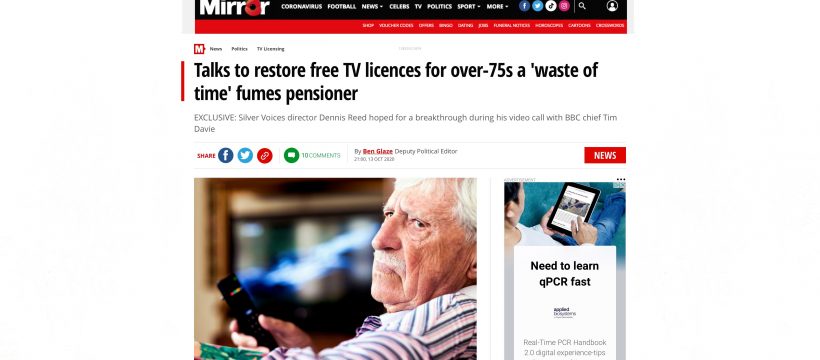On 13th Oct the BBC’s Director General, Tim Davie, held a video call with Silver Voices, who were campaigning for the restoration of free TV Licences for the over 75s. Afterwards it was branded a waste of time by Silver Voices director, Dennis Reed (in the Mirror newspaper above). The Conservatives had promised at the 2017 election to protect the free TV licences until the end of that parliament. It turned out that the Government had already handed over the responsibility to the BBC in 2015 to start from June 2020. The change has hit 3.7 million pensioners.
Age UK said: “We have always argued the Government was wrong to transfer responsibility for the concession to the BBC and that the BBC was wrong to accept it. We still believe that the TV licence should be free for all over 75s.”
On 15th Oct Age UK Director, Caroline Abrahams, met with Tim Davie, the BBC Director General, and outlined all of the problems people have been experiencing.
The Age UK website says: “Our concern has always been that if the Government thinks it can get away with handing over concessions like the TV licence, it might start looking at things like bus passes and the winter fuel allowance next.”
To sum up neither the Government nor the BBC are budging.
The Licence Fee/TV Tax
Last week the outgoing BBC chairman, Sir David Clemeiti, said that replacing the licence fee with a subscription model would be an “extraordinary act of self harm”. He said it would lead to cuts in services. So finally we have it, from the horses mouth, that it’s being kept going by the legal requirement. If customers had a proper choice it would lose lots of income.
For a transitional period I would suggest that some, but not all of the Freeview channels are kept going, but that the bulk of the BBCs output shifts onto a subscription model.
You have to pay your licence fee in advance, the subscription model is no different. If the Government chooses to help people out it could require broadcasters to share a part of their output on a free to access platform, or it could increase state pensions and Universal Credit payments by a small amount. Alternatives to the licence fee can be found. Currently the BBC pays Capita to chase people for the licence fee. It costs about £33 million a year. This seems like an enormous waste of money to me. Everybody else just needs your credit card details. Capita is also bombarding people who don’t watch broadcast TV with threatening letters. Not brilliant marketing is it?
The BBC produces figures and charts showing that people aged 16-34 spend seven and a half hours a week watching the BBC. I wonder if that’s really true. The BBC claims all adults watch the BBC for an average of 2.5 hours every day. It’s time to put it to a proper test!
Check if you can get a free over 75 TV Licence here.
How are things going at Netflix?
A few days ago pretty much every news outlet ran an article along the lines of the Sky News headline: ”Netflix subscriber growth stalls…” This is misleading nonsense. Netflix added 2.2 million new subscribers in the 3 months to 30th Sept. If the BBC was as popular as that it wouldn’t be in trouble. The Netflix figure was simply less than stock market had hoped. The profits at Netflix rose to $790 million for those 3 months! It had gained 16 million new subscribers in the first quarter of 2020 and 10 million in the second.
Netflix is filming in the UK
Netflix, is trebling its office space in London and said it will invest heavily in the British creative economy.
Last year it filmed more than 50 productions in the UK. The first (2016) series of The Crown was reputed to cost $13 million per episode. It’s won lots of awards.
Netflix is vague about the costs of it’s 2019 feature film, The Irishman ($159-250 million). It restricts releasing it’s movies to cinemas as it makes its money from £9 per month subscriptions. People watching at home now have big sharp screens and fast broadband. The Irishman was watched by 64 million households during its first four weeks of release. Netflix made that money for themselves, they didn’t have to share it with cinema owners.
Netflix started as an American DVD rental company in 1998. They started streaming films in 2007, but didn’t enter the UK market until 2012.


